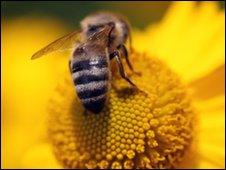Fears over Jersey's foulbrood bee disease discovery
- Published

Drifting drones can spread the disease from hive to hive
Jersey's bee population is under threat after the discovery of a disease which can potentially devastate colonies.
A test confirmed the presence of the bacterial American foulbrood disease in an island hive. It is believed to be the first case in Jersey.
The only way to control it is to stop all movement of hives, bees and equipment and to destroy all infected combs and bees.
The Environment Minister has declared the island an infected area.
The movement of bees and equipment will be stopped and beekeepers who are not members of the Jersey Beekeepers' Association are required to contact the Environment department.
Spore infection
American foulbrood is one of the most widespread and destructive of bee diseases.
It is caused by a bacteria which reproduces using spores. The spores are then eaten by bees which then become infected.
The bacteria multiply in the bee's gut, eventually killing it.
It is thought to be spread either by drifting bees such as drones who may visit a number of hives or when beekeepers transfer an infected comb from one hive to another.